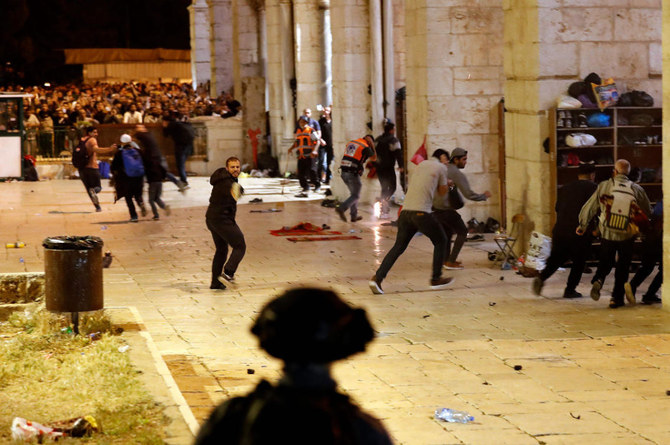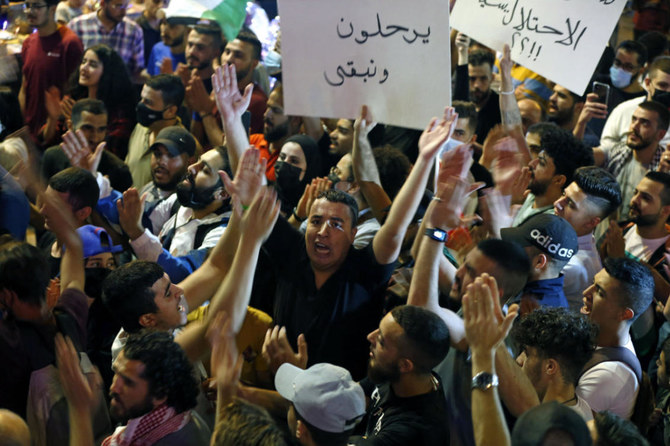JERUSALEM: Palestinian protesters threw rocks and Israeli police fired stun grenades and rubber bullets in clashes outside the Al-Aqsa Mosque in Jerusalem on Monday as Israel marked the anniversary of its capture of parts of the city in the 1967 Arab-Israeli war.
The Palestinian Red Crescent Society said more than 180 Palestinians were injured in the violence, of whom more than 80, including one person in critical condition, were transferred to hospitals.
Al-Aqsa, Islam’s third-holiest site, has been a focal point of violence in Jerusalem throughout the Muslim holy month of Ramadan. The clashes have raised international concern.
Tensions were particularly high as Israel was marked “Jerusalem Day,” its annual celebration of the capture of East Jerusalem and the walled Old City that is home to Muslim, Jewish and Christian holy places.
In an effort to ease the situation, Israeli police said they had banned Jewish groups from paying Jerusalem Day visits to the holy plaza that houses Al-Aqsa, and which Jews revere as the site of biblical Jewish temples.
Meanwhile, UN chief Antonio Guterres believes Israel “must exercise maximum restraint and respect the right to freedom of peaceful assembly,” a UN spokesman said, as tensions rise around Al-Aqsa, Islam’s third-holiest mosque.
“The Secretary-General expresses his deep concern over the continuing violence in occupied East Jerusalem, as well as the possible evictions of Palestinian families from their homes,” UN spokesman Stephane Dujarric said in a statement.
“He urges Israel to cease demolitions and evictions.”
Guterres urged that the status quo at the holy sites be upheld and respected, Dujarric said.
The late-night skirmishes raised the likelihood of further clashes Monday during the annual Jerusalem Day celebrations.
Israeli police gave the go-ahead to the parade Sunday, despite days of unrest and soaring Israeli-Palestinian tensions at a flashpoint holy site and in a nearby Arab neighborhood where Jewish settlers are trying to evict dozens of Palestinians from their homes.
Addressing a special Cabinet meeting ahead of Jerusalem Day, Prime Minister Benjamin Netanyahu said Sunday that Israel “will not allow any extremists to destabilize the calm in Jerusalem. We will enforce law and order decisively and responsibly.”
“We will continue to maintain freedom of worship for all faiths, but we will not allow violent disturbances,” he said. At the same time, he said, “We emphatically reject the pressures not to build in Jerusalem.”
The United States again expressed its “serious concerns” about the situation in Jerusalem, including clashes between Palestinian worshippers in Jerusalem’s Old City, home to sites sacred by Muslims and Jews, and Israeli police, as well as the expected expulsion of Palestinian families.
Washington made its concerns during a phone call between National Security Adviser Jake Sullivan and his Israeli counterpart. Sullivan urged Israel “to pursue appropriate measures to ensure calm during Jerusalem Day commemorations,” according to a statement by National Security Council spokeswoman Emily Horne.
Jerusalem Day is meant to celebrate Israel’s capture of east Jerusalem, home to the Old City and its sensitive holy sites, in the 1967 Mideast war. But the annual event is widely perceived as provocative, as hard-line nationalist Israelis, guarded by police, march through the Damascus Gate of the Old City and through the Muslim Quarter to the Western Wall, the holiest site where Jews can pray.
This year the march coincides with the Muslim holy month of Ramadan, a time of heightened religious sensitivities, and follows weeks of clashes. That, combined with Palestinian anger over the eviction plan in the nearby Sheikh Jarrah neighborhood, could set the stage for an especially volatile day.
Amos Gilad, a former senior defense official, told Army Radio that the parade should be canceled or at least kept away from Damascus Gate, saying “the powder keg is burning and can explode at any time.” Israel’s public broadcaster Kan said the final route of the parade had not yet been decided.
In recent days, dozens of Palestinians have been wounded in clashes near the Al-Aqsa mosque compound in the Old City. The site, known to Jews as the Temple Mount and to Muslims as the Noble Sanctuary, is considered the holiest site in Judaism and the third holiest in Islam. It has been a tinderbox for serious violence in the past.
“The occupier plays with fire, and tampering with Jerusalem is very dangerous,” Saleh Arouri, a top Hamas official, told the militant group’s Al-Aqsa TV station.
Israel captured east Jerusalem, along with the West Bank and Gaza Strip, in the 1967 war. The Palestinians seek all three areas for a future state, with east Jerusalem as their capital.
The violence, along with the planned evictions in east Jerusalem, have drawn condemnations from Israel’s Arab allies and expressions of concern from the United States, Europe and the United Nations.
In Sunday night’s clashes, Palestinian protesters shouted at police and pelted them with rocks and bottles, while police fired stun grenades and a water cannon to disperse the crowds. Palestinian medics said at least 14 protesters were injured.
The clashes were less intense than the previous two nights. Police said over 20 police officers had been injured in recent days.
But there were signs the violence was beginning to spread.
Late Sunday, Palestinian militants in the Gaza Strip fired four rockets toward Israel, setting off air raid sirens in southern city of Ashkelon and nearby areas, the Israeli military said. It said one rocket was intercepted, while two others exploded inside Gaza. Early Monday, Israeli tanks and artillery struck several Hamas posts near the border in retaliation for the rocket fire. There were no reports of injuries.
Earlier in the day, Israel carried out an airstrike on a Hamas post in response to another rocket attack. Gazan protesters affiliated with Hamas militant group also launched incendiary balloons into southern Israel during the day, causing dozens of fires.
In Jerusalem, meanwhile, Israeli police also clashed with hundreds of Arab students at Israel’s Hebrew University, using stun grenades to disperse the crowd. Police said 15 people were arrested at another protest in the northern city of Haifa.
Jordan and Egypt, the first two countries to strike peace deals with Israel, both summoned senior Israeli diplomats to condemn the Israeli actions.
Jordan’s King Abdullah II, who acts as custodian of Jerusalem’s Muslim holy sites, condemned what he called “Israeli violations and escalating practices” and urged Israel to halt its “provocations against Jerusalemites.”
At the Vatican, Pope Francis said he was following the events in Jerusalem with worry and called for an end to the clashes.
“Violence only generates violence,” he told the public gathered at St. Peter’s Square.
With tensions high, the Israeli Supreme Court postponed a decision on the possible evictions in Sheikh Jarrah. The decision had been expected for Monday, but was pushed back by up to 30 days in light of “circumstances,” the court said
Palestinians and international rights groups portray the planned evictions as a part of a campaign by Israel to drive Palestinians from traditionally Arab neighborhoods, especially in the heart of Jerusalem. Israel has cast the evictions case as a real estate dispute.
The flare-up in hostilities comes at a crucial point in Israel’s political crisis after longtime leader Netanyahu failed to form a governing coalition. His opponents are now working to build an alternate government. If they succeed, Netanyahu would be pushed to the opposition for the first time in 12 years.







































